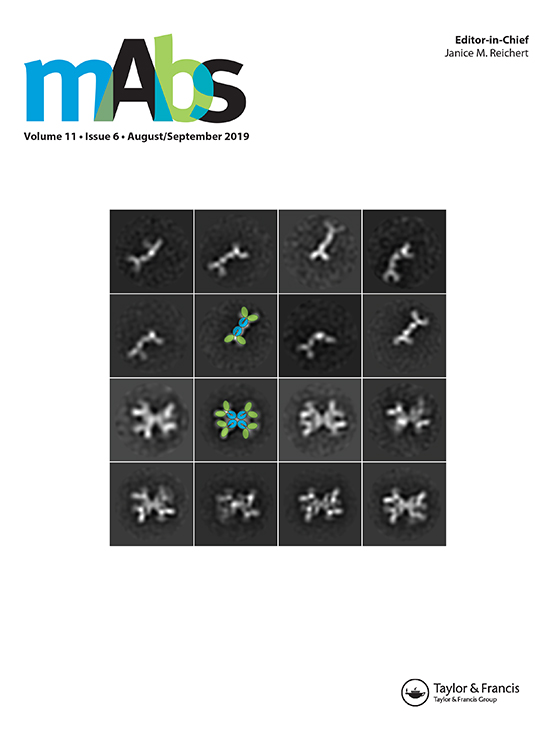基于序列的 pH 值敏感抗体工程,用于肿瘤靶向或内体循环。
IF 7.3
2区 医学
Q1 MEDICINE, RESEARCH & EXPERIMENTAL
引用次数: 0
摘要
对酸碱度敏感的治疗性抗体工程学,尤其是用于提高在酸性实体瘤微环境中的有效性和特异性的抗体工程学,最近得到了越来越多的关注。虽然对 pH 依赖性免疫疗法有合理的需求,但目前的工程技术繁琐费力,需要在不同的 pH 条件下反复进行实验。预测 His pH 开关有效性的廉价计算技术需要抗体-抗原复合物结构,但在大多数情况下缺乏这种结构。为了规避这些要求,我们引入了一种基于序列的硅学方法,用于预测抗体可变区中的 His 突变,这些突变可能会导致 pH 偏向的抗原结合。这种方法被称为 "基于序列的 pH 敏感抗体结合鉴定(SIpHAB)",它是在对 3490 个已解决实验结构的抗体-抗原复合物进行三维结构计算的基础上训练出来的。对 SIpHAB 进行了参数化处理,以增强其对酸性 pH 的优先结合力,分别用于选择性靶向实体瘤或在内质体中释放抗原。对之前报道的九种抗体-抗原系统在不同 pH 值下的结合偏好的应用证明了这种高通量计算工具的实用性和富集能力。SIpHAB 只需了解抗体的一级氨基酸序列,就能比传统方法更有效地筛选出对 pH 值敏感的候选抗体。运行 SipHAB 的在线网络服务器可在 https://mm.nrc-cnrc.gc.ca/software/siphab/runner/ 免费获取。本文章由计算机程序翻译,如有差异,请以英文原文为准。
Sequence-based engineering of pH-sensitive antibodies for tumor targeting or endosomal recycling applications.
The engineering of pH-sensitive therapeutic antibodies, particularly for improving effectiveness and specificity in acidic solid-tumor microenvironments, has recently gained traction. While there is a justified need for pH-dependent immunotherapies, current engineering techniques are tedious and laborious, requiring repeated rounds of experiments under different pH conditions. Inexpensive computational techniques to predict the effectiveness of His pH-switches require antibody-antigen complex structures, but these are lacking in most cases. To circumvent these requirements, we introduce a sequence-based in silico method for predicting His mutations in the variable region of antibodies, which could lead to pH-biased antigen binding. This method, called Sequence-based Identification of pH-sensitive Antibody Binding (SIpHAB), was trained on 3D-structure-based calculations of 3,490 antibody-antigen complexes with solved experimental structures. SIpHAB was parametrized to enhance preferential binding either toward or against the acidic pH, for selective targeting of solid tumors or for antigen release in the endosome, respectively. Applications to nine antibody-antigen systems with previously reported binding preferences at different pHs demonstrated the utility and enrichment capabilities of this high-throughput computational tool. SIpHAB, which only requires knowledge of the antibody primary amino-acid sequence, could enable a more efficient triage of pH-sensitive antibody candidates than could be achieved conventionally. An online webserver for running SipHAB is available freely at https://mm.nrc-cnrc.gc.ca/software/siphab/runner/.
求助全文
通过发布文献求助,成功后即可免费获取论文全文。
去求助
来源期刊

mAbs
工程技术-仪器仪表
CiteScore
10.70
自引率
11.30%
发文量
77
审稿时长
6-12 weeks
期刊介绍:
mAbs is a multi-disciplinary journal dedicated to the art and science of antibody research and development. The journal has a strong scientific and medical focus, but also strives to serve a broader readership. The articles are thus of interest to scientists, clinical researchers, and physicians, as well as the wider mAb community, including our readers involved in technology transfer, legal issues, investment, strategic planning and the regulation of therapeutics.
 求助内容:
求助内容: 应助结果提醒方式:
应助结果提醒方式:


